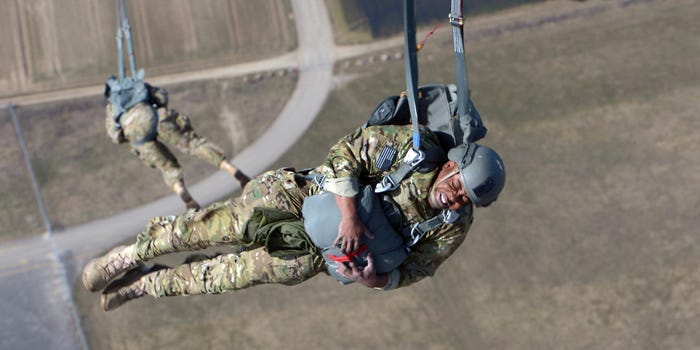A 10th Special Forces Group soldier free falls over a drop zone in Germany, March 17, 2015.
- During the war on terror, US Army Special Forces revived its 18X program in order to expand recruitment.
- Known as a non-prior service Special Forces candidate contract, 18X allows enlistees to go right to Special Forces selection.
- The 18X program has a mixed reputation in the Army Special Forces community.
Following the invasions of Afghanistan and Iraq, the Pentagon quickly realized that it would need more special operators.
Special-operations forces, with unique skills tailored to counterterrorism and counterinsurgency, were highly effective on those battlefields — and in high demand by US commanders.
But the sprawling campaigns against the Taliban, Al Qaeda, and other terrorist organizations demanded more commandos than the US military had on hand, so every special-operations unit started recruiting heavily.
The Army Special Forces Regiment — which had a central role in combating those groups and training partner forces to do so — revived an old program allowing civilians a chance to become a Green Beret.
Established in 1952, the Green Berets are the US military’s premier special-operations unit for unconventional warfare and foreign internal defense, which entails training and advising other militaries and armed groups.
The 18X program has a mixed reputation in the Army Special Force community. Some Green Berets believe that candidates who make it over the lower barrier to entry can the dilute their units, known as operational detachments, and decrease their combat effectiveness.
Others hold that 18X candidates have a lot of potential and can become great operators.
“I’m a fan of the X-ray program. There are plenty of civilians that with training can become very successful Green Berets. After being selected, 18x have a very high graduation rate that hovers in the 80 percentile,” John Black, a retired Special Forces Warrant Officer, told Insider.
Officers who follow the regular selection route for Army Special Forces, designated 18As, have the highest graduation rates, with close to a 90% success rate. To become a Green Beret officer, one must be in the military and have commanded a unit before applying. They know that they only get one shot, which may explain their high success rate.
18X candidates have a success rate of about 80%. Candidates from conventional Army units have a success rate of roughly 50%.
Although 18X candidates are extremely fit and motivated, they generally lack experience and, in some cases, maturity. The latter was one of the greatest concerns with the Army Special Forces community when the 18X program started.
Those attributes are especially important for Green Berets because they work in very small teams and are often deployed behind enemy lines. They need to have strong personalities to instill confidence in and lead the troops and guerrillas they train and sometimes fight alongside. They need to convince those partners that the US military is with them. In many ways, they represent America abroad.
“Maturity varies with X-Rays, because some are 20 years old, others are in their late 30s or 40s. What X-rays lack is general Army knowledge [but] that is acquired through experience,” Black said.
Retention is also an issue with the 18X program. Green Berets who come in through this route tend to stay for shorter periods than those who were already in the Army when they join.
“18 X-ray Green Berets tend to get out after one [enlistment] term,” Black said, attributing the disparity to candidates from “Big Army” already being invested in the service “for some time before even accepting the challenge” of joining Special Forces.
After September 11, the 18X program appealed to many volunteers who sought the opportunity to fight those responsible for the attacks. The Green Berets and other US special-operations forces saw near-constant combat over the following 20 years.
With the withdrawal from Afghanistan and US operations in Iraq winding down, the prospect of seeing combat in the near-term is diminished, and there are now fewer candidates coming through the 18X pipeline.
“One issue that the Special Forces Regiment is currently having is that all the 9/11 guys that joined are ready for retirement,” Black said.
Click here to view original web page at www.businessinsider.com
Article Read Time
Avg Reading Time: 4.6 Minutes


